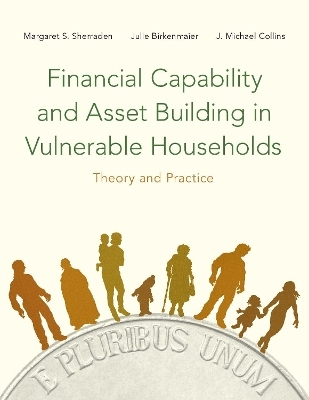
Financial Capability and Asset Building in Vulnerable Households
Oxford University Press Inc (Verlag)
978-0-19-023856-8 (ISBN)
Financial struggles of American families are headline news. In communities across the nation, families feel the pinch of stagnant and sometimes declining incomes. Many have not recovered from the Great Recession, when millions lost their homes and retirement savings. They are bombarded daily with vexing financial decisions: Which bills to pay? Where to cash checks? How to cover an emergency? How to improve a credit report? How to bank online? How to save for the future?
Low- and moderate-income families have few places to turn for guidance on financial matters. Not many can afford to pay a financial advisor to help navigate an increasingly complex financial world. They do their best with advice from family and trusted individuals.
Social workers, financial counselors, and human services professionals can help. As "first responders," they assist families and help in finding financial support from public and private sources. But these professionals are too often unprepared to address the full range of financial troubles of ordinary working families.
Financial Capability and Asset Building in Vulnerable Households is the first book of its kind. It prepares social workers, financial counselors, and other human service professionals for financial practice with vulnerable families. Building on more than 20 years of research, the book sets the stage with key concepts, historical antecedents, and current financial challenges of families in America. The book provides knowledge and tools to assist families in pressing financial circumstances. It offers a lifespan perspective of financial capability and environmental influences on financial behaviors and actions. This important text details practice principles and skills for direct interventions, as well as for designing financial services and policy innovations. This is an essential text for preparing the next generation of practitioners who can enable families to achieve economic security and development.
Margaret S. Sherraden, PhD, MA, is Professor Emeritus at the University of Missouri-St. Louis and Research Professor at Washington University in St. Louis. Julie Birkenmaier is a Professor at Saint Louis University School of Social Work and a Project Co-Director of Financial Capability with the Center for Social Development at Washington University in St Louis. J. Michael Collins is the Faculty Director of the Center for Financial Security at the University of Wisconsin-Madison, and Associate Professor in the School of Human Ecology and at the La Follette School of Public Affairs
Acknowledgments
Introduction
Part I: Setting the Stage: Financial Capability and Asset Building in Financially Vulnerable Households
Chapter 1: Financial Well-Being: Basic Concepts
Chapter 2: Financial Vulnerability in American Families: A Portrait
Chapter 3: History of Financial Capability and Asset Building in America
Chapter 4: Financial Institutions, Products, and Services
Chapter 5: Understanding Household Finance: Income Statements and Balance Sheets
Part II: Household Finance: Building a Foundation for Financial Capability and Asset Building
Chapter 6: Household Income
Chapter 7: Taxes and Financially Vulnerable Households
Chapter 8: Values, Goals, and Spending Plans
Chapter 9: Short-Term and Emergency Savings
Chapter 10: Long-Term Savings and Asset Accumulation: Building a Future
Chapter 11: Credit and Credit Building
Chapter 12: Higher Education
Chapter 13: Housing and Homeownership
Chapter 14: Debt, Problem Debt, and Debt Negotiation
Chapter 15: Risk Management and Insurance
Chapter 16: Identity Theft and Protection
Chapter 17: Collections, Garnishments, and Bankruptcy
Chapter 18: Preparing for Financial Security in Old Age
Chapter 19: Putting Financial Affairs in Order: Estate Planning
Part III: Human Services: Financial Capability and Asset-Building Practice
Chapter 20: Financial Capability in the Social Environment: Preparing for Financial Capability and Asset-Building Practice
Chapter 21: Financial Practice with Individuals and Families
Chapter 22: Financial Capability and Asset Building in Organizations, Communities, and Policy
Chapter 23: Career Pathways in Financial Capability and Asset-Building Practice
Glossary
Index
| Erscheinungsdatum | 01.08.2018 |
|---|---|
| Verlagsort | New York |
| Sprache | englisch |
| Maße | 277 x 213 mm |
| Gewicht | 1080 g |
| Themenwelt | Sachbuch/Ratgeber ► Beruf / Finanzen / Recht / Wirtschaft ► Geld / Bank / Börse |
| Sachbuch/Ratgeber ► Gesundheit / Leben / Psychologie | |
| Sozialwissenschaften ► Pädagogik ► Sozialpädagogik | |
| Sozialwissenschaften ► Politik / Verwaltung ► Politische Systeme | |
| Sozialwissenschaften ► Soziologie | |
| Wirtschaft ► Betriebswirtschaft / Management ► Finanzierung | |
| Wirtschaft ► Volkswirtschaftslehre ► Finanzwissenschaft | |
| ISBN-10 | 0-19-023856-9 / 0190238569 |
| ISBN-13 | 978-0-19-023856-8 / 9780190238568 |
| Zustand | Neuware |
| Haben Sie eine Frage zum Produkt? |
aus dem Bereich


